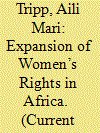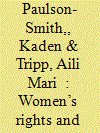|
|
|
Sort Order |
|
|
|
Items / Page
|
|
|
|
|
|
|
| Srl | Item |
| 1 |
ID:
159481


|
|
|
|
|
| Summary/Abstract |
We provide new theory and evidence of the role of domestic women’s coalitions in the adoption of gender quotas. Previous research has shown the importance of women’s movements to policy change. We show that specific types of mobilization, often multiethnic in character, are a more precise way of describing these influences. Using a new dataset of coalitions in 50 countries in Africa (1989–2014), we first examine where coalitions are likely to emerge. Controlling for factors that correlate with their formation, we find that when domestic women’s organizations form a coalition for quotas, governments are more likely to adopt them and do so more quickly. This correlation holds when controlling for international aid, involvement of international women’s movements, and whether countries recently emerged out of major armed conflict, complementing recent scholarship that highlights global influences. A comparative case study of the adoption of a gender quota in Senegal and non-adoption in Benin helps illustrate the nuances of the theory.
|
|
|
|
|
|
|
|
|
|
|
|
|
|
|
|
| 2 |
ID:
190358


|
|
|
|
|
| Summary/Abstract |
Twenty years after the African Union adopted the Maputo Protocol on the Rights of Women in Africa, constitutional and legislative provisions on women’s rights have proliferated across the continent. Sub-Saharan Africa has achieved some of the world’s highest rates of improvement in women’s economic empowerment. African women have also been at the forefront of global efforts to increase female representation in political and business leadership, peacebuilding, and other areas. But progress on women’s rights has been weaker in the domain of family law on issues including inheritance rights and reproductive freedom. Africa also ranks lowest in closing the gender gap in education, despite major gains at the primary school level.
|
|
|
|
|
|
|
|
|
|
|
|
|
|
|
|
| 3 |
ID:
096295


|
|
|
|
|
| Publication |
2010.
|
| Summary/Abstract |
I ask whether comparative politics of gender (CPG) can maintain its normative roots in concerns related to social justice as it moves increasingly away from its interdisciplinary moorings in gender/women's studies and gravitates toward disciplinary concerns. I call for a broad framework for CPG, examining 1) the range and relevance of the questions we ask, the utility of interdisciplinarity, and the range of methods employed; 2) the research collaborations we develop, especially outside of the US-Europe nexus; 3) the way our work is disseminated; and 4) how it engages the policy and practitioner community.
|
|
|
|
|
|
|
|
|
|
|
|
|
|
|
|
| 4 |
ID:
181243


|
|
|
|
|
| Summary/Abstract |
Women’s rights are being enshrined in African constitutions today to an unprecedented extent. African countries have on average more constitutional provisions addressing women’s rights than any other region of the world. This longitudinal cross-national study shows that constitutional reforms in African contexts are increasingly evident in the areas of gender equality, customary law, discrimination, violence against women, gender quotas, and citizenship rights, and they sometimes reflect gender-inclusive language. By analysing a novel data set of constitutional reforms across all African countries over 68 years (1951–2019), this article identifies four critical junctures when the adoption of women’s rights reforms arose, namely (i) after independence, particularly in Muslim-majority countries; (ii) after political opening in the 1990s; (iii) after the end of major civil conflicts; and (iv) after the 2011 Arab uprisings. At each juncture, women’s movements capitalized on political openings to advance constitutional reforms that are unmatched on a global scale. This article goes beyond the existing explanations of cumulative gains, international influence, diffusion, learning, and borrowing to show that a ‘critical junctures’ approach may help explain when, why, and how women’s rights reforms occur in constitutions.
|
|
|
|
|
|
|
|
|
|
|
|
|
|
|
|
|
|
|
|
|